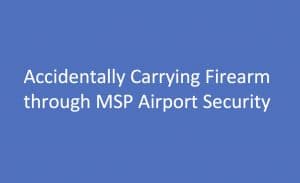Accidentally Carrying Firearm through MSP Airport Security
Have you ever been to the airport and forgot you had a bottle of water in your bag? TSA normally just requests for the bottle to be thrown away, and you can continue through the security checkpoint to your gate without incident. If you forgot your firearm was in your bag, it will not be treated the same at the security checkpoint, however.
The Metropolitan Airports Commission (MAC) passed ordinance no. 117 in 2013. This ordinance prohibits a person from presenting a firearm at a security screening area at the airport without first notifying the screening personnel. (MAC 177) The first part of the ordinance states “No Person shall place a firearm, explosive device, or other TSA prohibited item that could be used as a weapon onto inspection equipment at a Security Screening Area without first declaring such item to the Screening Personnel at the Security Screening Area.” (MAC 117.6.5) The next section states this ordinance is for the public safety and welfare of Airport travelers, so this provision of this ordinance is to be a strict liability offense. (Mac 117.6.5)
Who can be Charged with This Crime and What is a Security Screening Area?
“Person” is defined under this ordinance under section 1.20 as “Every natural Person, firm, partnership, association, corporation, or other entity.” A Security Screening Area is defined as an area where persons or baggage are inspected. (MAC 177.1.26) As a result, any person who presents a firearm at a security checkpoint in an airport without first informing the staff working the security area will be cited for Presenting Prohibited Item at Security, and this ordinance results in a misdemeanor criminal charge. This means the ordinance is not limited only to customers using the airport to travel but all employees of the airport as well.
What does Strict Liability Mean?
Criminal laws or ordinances require either mens rea also known as intent or do not require intent also known as a strict liability crime. The MAC ordinance no. 177 does not have an intent requirement the Minnesota Court of Appeals has found this to be a strict liability crime. State v. Eide. This means that a person does not need to know that they had a firearm in their bag at the time of presenting it at a security checkpoint rather it only matters that a firearm was presented at the security checkpoint. Strict liability crimes hold people accountable despite their lack of intent in committing a crime.
What are the Consequences?
The person can received a citation for a misdemeanor, which has maximum punishment of up to 90 days in jail and a fine of no more than $1,000.
This strict liability restriction on firearms at an airport checkpoint security serves as a friendly reminder to triple-check all your bags or luggage before walking up at a security checkpoint because you are not required to have the intent to conceal a firearm for this citation and misdemeanor charge to be issued. You can also lose your firearm as the state will look to forfeit the weapon; and face potential civil penalties.
Robert H. Ambrose is a criminal defense attorney and DWI lawyer in Minnesota. Super Lawyers named him Super Lawyer the past two years and a Rising Star the previous six years. He is an adjunct professor at the University of Minnesota Law School. DWI Attorney Woodbury MN, Criminal Defense Lawyer Minneapolis MN, Criminal Appeals Lawyer Minnesota.


No comments:
Post a Comment